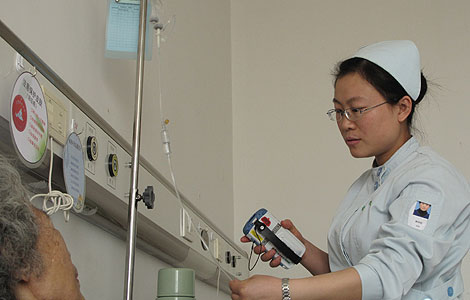Nurse eases last days of patients
Updated: 2012-05-11 07:24
By Liu Ce and Wu Yong in Shenyang (China Daily)
|
||||||||
 |
|
Nurse Sun Xianghong checks on a patient in a hospital in Shenyang, Liaoning province, recently. LIU CE / CHINA DAILY |
The patients in nurse Sun Xianghong's palliative care unit have more control over their environment than those in other wards, and can even change the color of the walls in their rooms.
It could be one of the last things in life they can control.
"They might not be able to go home after checking into the palliative care unit," said Sun. "So it is up to us to make them feel at home."
Soon after transferring from the intensive care unit, the 30-year-old nurse at Shengjing Hospital in Shenyang, Liaoning province, learned that the ultimate goal of palliative care is to achieve the best quality of life possible for patients in their last days.
The first time a patient changed every piece of furniture in her ward into pink - which was against hospital regulations - Sun tried to stop her.
Then the patient's husband responded in tears: "Didn't you tell her to make herself at home here? She might not be able to go to her real home anymore."
"It was at that moment that I realized the basic difference between working in the ICU and here," Sun said. "In the ICU, we work to save lives, while here, our major responsibility is to relieve patients' pain from illness and fear of death, and ensure them a peaceful departure."
Easy as it sounds, it took Sun and her colleagues some time to adjust to their new work at the palliative care unit the hospital set up in 2008.
"The hardest part is not professional techniques, but the change in our minds and thoughts," Sun said.
For example, Sun said, to avoid patients getting bedsores in the ICU, nurses have to turn them over every two hours.
"We just do it as a procedure without too much thinking," she said. However, in the palliative care unit, patients are far more fragile and often can't endure the pain caused by changing their position. Some patients would rather have bedsores.
"We can do nothing but respect their choices," Sun said.
Moreover, 90 percent of her patients don't know their illness is terminal. Relatives often ask doctors and nurses to keep the truth from patients.
"We usually make two different clinical charts. One is false for the patient. The other is true for doctors," she said.
However, some patients learn about their illness accidentally. "They usually get mad and refuse to receive any medical treatment, or even abuse us," said Sun.
"Under such circumstances, words are so feeble. Listening to them is the best remedy, which sometimes also serves as the key to real solutions."
Sun recalled one patient who was so moody he abused every person caring for him, including his wife, children and nurses. It took a few days to figure out the reason behind his frustration. As an ardent sports fan, the patient was afraid he might not be able to watch the 2008 Beijing Olympics because there was no TV in his ward, and he might never go home.
Knowing that, the hospital made an exception, allowing his family to install a large-screen TV in his ward. The patient became amiable and died with a smile three days after the Olympics concluded.
"In fact, what we can do for them, like chatting with them, is limited. But we learn a lot from them," Sun said.
Contact the writers at liuce@chinadaily.com.cn and wuyong@chinadaily.com.cn.

 Relief reaches isolated village
Relief reaches isolated village
 Rainfall poses new threats to quake-hit region
Rainfall poses new threats to quake-hit region
 Funerals begin for Boston bombing victims
Funerals begin for Boston bombing victims
 Quake takeaway from China's Air Force
Quake takeaway from China's Air Force
 Obama celebrates young inventors at science fair
Obama celebrates young inventors at science fair
 Earth Day marked around the world
Earth Day marked around the world
 Volunteer team helping students find sense of normalcy
Volunteer team helping students find sense of normalcy
 Ethnic groups quick to join rescue efforts
Ethnic groups quick to join rescue efforts
Most Viewed
Editor's Picks

|

|

|

|

|

|
Today's Top News
Health new priority for quake zone
Xi meets US top military officer
Japan's boats driven out of Diaoyu
China mulls online shopping legislation
Bird flu death toll rises to 22
Putin appoints new ambassador to China
Japanese ships blocked from Diaoyu Islands
Inspired by Guan, more Chinese pick up golf
US Weekly

|

|






